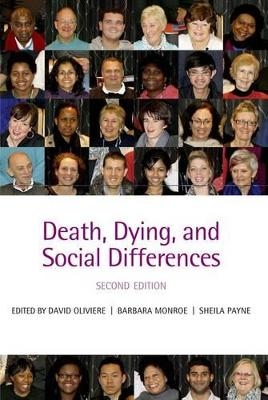
Death, Dying, and Social Differences
Oxford University Press (Verlag)
978-0-19-959929-5 (ISBN)
This book explores what underpins inequality, disadvantage and injustice in access to good end of life care. Increasingly clinicians, policy planners, and academics are concerned about inequity in service provision. Internationally, there is an increasing focus and sense of urgency both on delivering good care in all settings regardless of diagnosis, and on better meeting the needs of vulnerable and disadvantaged groups.
National initiatives emphasise the importance of resolving disparities in care and harnessing empowered user voices to drive change. This newly expanded, fully revised second edition, with 11 new chapters, provides a comprehensive analysis of discrimination, difference and disadvantage in end of life care, and offers practical guidance for all who seek to support the equitable provision of good end of life care.
David trained at Nottingham University in social administration and social work. With a background in psychiatric social work and management in the personal social services, David was involved with Pilgrim's Hospice, Canterbury, before joining the North London Hospice as Director of Social Work. Subsequently David worked as Community Care Advisor for ethnic minorities and refugees, LB Enfield, and more recently as Macmillan Principal Lecturer in Palliative Care at Middlesex University, whilst practising at the Macmillan Support Team at Barnet Hospital. David has spoken widely internationally. His special interests include user involvement, culture and ethnicity, work with families, staff stress and teaching skills. He is Visiting Professor at the School of Health and Social Sciences, Middlesex University. Barbara has been a social worker for over 30 years. She joined St Christopher's Hospice in 1987 and became Chief Executive in 2000. She is founder and Director of the Candle children's bereavement project at St Christopher's and was Chair of the national Childhood Bereavement Network for eight years. She is Module Leader on the MSc in Palliative Care and Policy run jointly by St Christopher's and King's College London. Barbara is a well-known speaker and lecturer and has delivered training programmes across the world. She has written extensively about psychological and social aspects of palliative care and sits on a variety of national committees supporting the development of end of life care. Barbara is an Honorary Professor at the International Observatory on End of Life Care at Lancaster University and has a long term interest in how we achieve 'good enough' end of life care for all. She was appointed Dame Commander of the Order of the British Empire in the Queen's Birthday Honours List 2010. Sheila Payne is a health psychologist with a background in nursing. She holds honorary visiting chairs at Monash University, Melbourne, Australia and Trinity College, Dublin, Ireland. Professor Payne has a long track record in palliative care research and scholarship. Her research agenda focuses on palliative and end-of-life care for older people and bereavement support. She holds a number of major grants in these areas and has supervised over 20 PhD students. She teaches on research methods and has co-edited a textbook on research methods in palliative care. She is Director of the NCRI funded Cancer Experiences Collaborative. She is Vice President of the European Association of Palliative Care and president elect from 2011. Sheila has published widely in academic and professional journals, written eleven books, and formerly edited (with Sandra Horn) the 'Health Psychology' book series published by the Open University Press.
Foreword ; PART ONE ; 1. Social differences - the challenge for palliative care ; 2. The emergence of new forms of dying in contemporary societies ; 3. Social inequality in dying ; 4. Place and space: geographic perspectives on death and dying ; 5. Communication, information and support ; 6. Poverty and finance ; 7. Embracing diversity at the end of life ; 8. Disability and the death and dying agenda ; PART TWO ; 9. Death and dying in older people ; 10. Vulnerable adults and families ; 11. Dying as a teenager or young person ; 12. People with intellectual disabilities ; 13. Mental health needs ; 14. People with dementia ; 15. Homeless people ; 16. Travellers' death and dying ; 17. Asylum seekers and refugees ; 18. Palliative care for substance abusers ; 19. Family carers and social difference ; 20. Sexual orientation ; 21. Palliative care for prisoners ; 22. Bereavement - a world of difference ; Afterword
| Zusatzinfo | 6 black and white line drawings |
|---|---|
| Verlagsort | Oxford |
| Sprache | englisch |
| Maße | 163 x 229 mm |
| Gewicht | 372 g |
| Themenwelt | Medizin / Pharmazie ► Gesundheitswesen |
| Medizin / Pharmazie ► Medizinische Fachgebiete ► Palliativmedizin | |
| Medizin / Pharmazie ► Pflege ► Palliativpflege / Sterbebegleitung | |
| Studium ► 1. Studienabschnitt (Vorklinik) ► Med. Psychologie / Soziologie | |
| Sozialwissenschaften ► Soziologie ► Mikrosoziologie | |
| ISBN-10 | 0-19-959929-7 / 0199599297 |
| ISBN-13 | 978-0-19-959929-5 / 9780199599295 |
| Zustand | Neuware |
| Haben Sie eine Frage zum Produkt? |
aus dem Bereich


